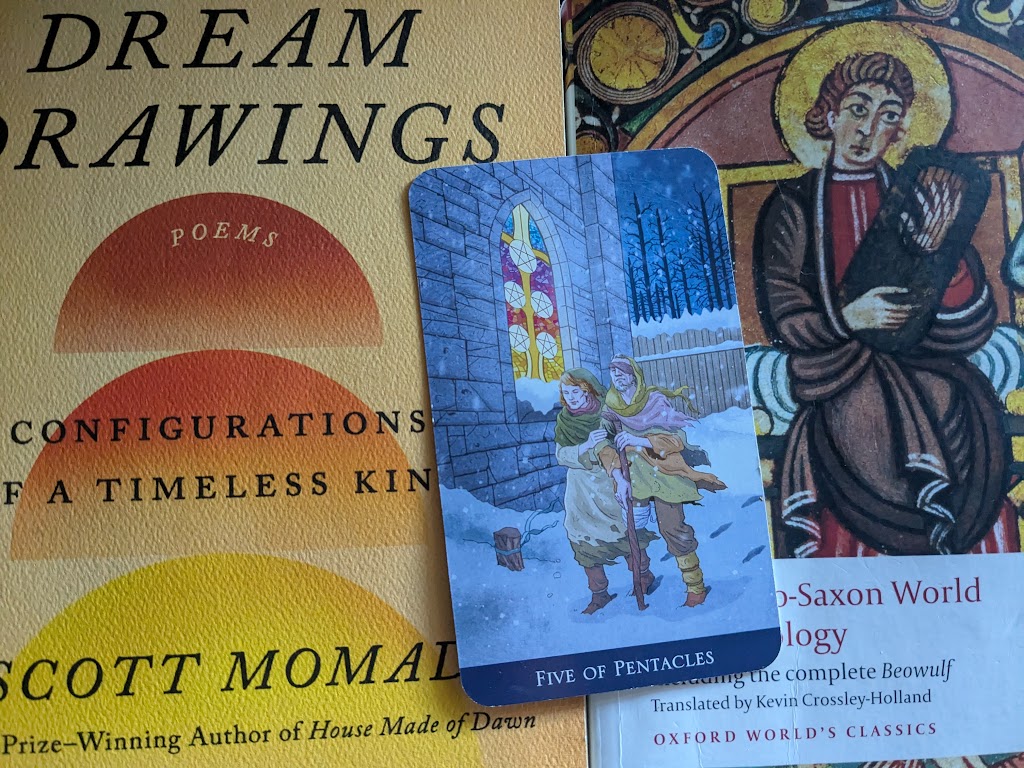Five of pentacles reversed
In the Five of Pentacles, a man and woman stumble through a snow storm in tattered clothes. The man hobbles with a staff and the two lean into each other. Behind them dark winter trees stand naked in the night. But they are near a church that offers warmth and respite. Fives, as I’ve already explored, hold a sense of imbalance, which when at work in this image suggests an imbalance of resources. The image suggests the man and woman are homeless or exiles; their material resources are imbalanced. But the presence of the church reminds us we can also have spiritual imbalance.
I am reminded of two poems: the first is “The Wanderer,” an Old English poem, and “The Visitors” by N. Scott Momaday. First, “The Wanderer.”
The poem begins with a narrator who describes the predominant speaker of the poem, a “wanderer” who “must dip his oars/into icy waters…/follow the paths of exile.” This exiled man laments his loss of country, kin, and lord; he mourns “hall retainers and treasure/and how, in his youth, his gold-friend/entertained him” and in a later stanza he mourns “the gleaming cup, the warrior in his corselet,/the glory of the prince.” “Where has the horse gone? Where the man? Where the giver of gold?” The translator of this poem, Kevin Crossley-Holland, explains in the introduction that this man “describes how, after the death of his lord, he has lost his place in society, and, as an outcast, must search for another lord who will take him under his wing”(47). This is an important point when thinking about the Five of Pentacles and the state of being homeless or without resources. It’s so easy to judge the homeless for getting themselves into the mess of not having a home at all—it’s so easy to blame. Likewise, it’s easy to blame the self for being in a state of self-exile: “I deserve this.” However, the man in “The Wanderer” cannot help his lord died (for, as the narrator says, after all, “fate is inflexible”). Death is simply part of life. Of course he would mourn this loss, of course he would grieve his situation, his literal homelessness; and the desert of icy ocean where he watches a bird gleefully splash in the waves only reminds him of how much he doesn’t belong right now. But he couldn’t help it, just as the man and woman in the card maybe cannot help their situation, just as we often cannot help it when “the whole world becomes a wilderness.”
Now for Momaday’s poem: The speaker describes an evening country church service held during the middle of a snow storm. Pastor Anders preached “on the subject of forgiveness.” He knows his congregation well and was surprised to see three women come into the church and “appear out of nowhere on such a forbidding night.” They listened “enclosed in silence” but left before he could speak with them, and they left abruptly “as if to keep an appointment at the center of darkness.” When he steps outside the church to search for them, “there were no footprints in the snow. There was only wonder and the profound isolation of the winter night.” I cannot help but wonder if the three women who come and go from the winter storm are not like the couple in the Five of Pentacles, but rather that the preacher, who contemplates forgiveness, is the one with a deeper sense of “profound isolation” for it is he who is left with that residue, not the women. These women know what they are up to, whereas Pastor Anders is left dumbfounded by their self-assuredness, he is left palpably feeling their absence.
What stirs up these feelings for us? What brings us comfort? Sometimes we need to stop lying to ourselves and recognize it is us in a state of absence, it is us lost in “profound isolation,” it is us who need to ask, “Where has the horse gone? Where the man? Where the giver of gold?” And when we do, when we decide we need to keep our “appointment at the center of darkness” we will experience a deeper kind of wonder.
Bibliography:
The Anglo-Saxon World, An Anthology. 1982. Trans. Kevin Crossley-Holland. Oxford University Press, 2009.
Momaday, N. Scott. “The Visitors.” Dream Drawings, Configurations of a Timeless Kind. Harper Perennial, 2022.
(My Tarot deck is Llewellyn’s Classic Tarot by Barbara Moore and illustrated by Eugene Smith.)

